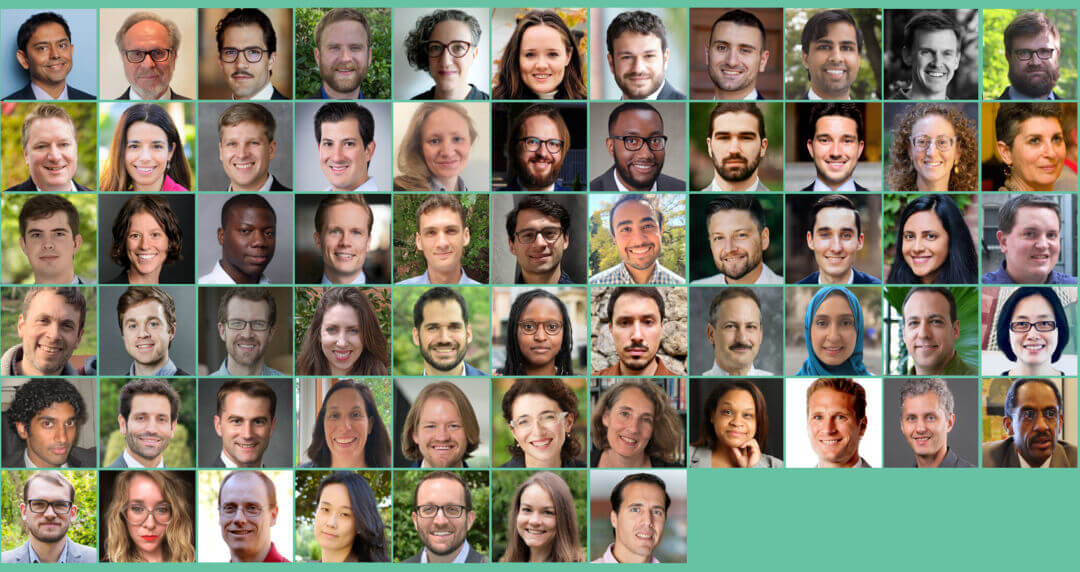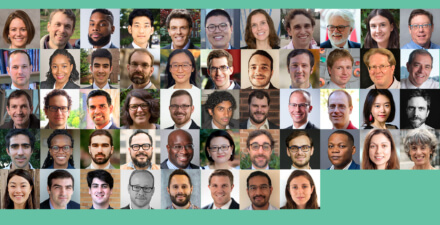Equitable Growth announces record $1.39 million in research grants for scholars examining economic inequality and growth

The Washington Center for Equitable Growth today announced its 2021 research grants, with funding of $1,392,795—a record-breaking level—awarded to 62 researchers. These scholars are studying the various channels through which economic inequality, in all its forms, impacts economic growth and stability.
For the past 8 years, Equitable Growth has funded economists and social scientists in various stages of their careers, including faculty members, postdoctoral students, and Ph.D. candidates at U.S. colleges and universities. This year’s cohort of scholars makes up the largest group of annual grantees in Equitable Growth history, with 48 academic and 14 doctoral grantees.
“The advances from every research grant will be invaluable to broadening our knowledge of the challenges and opportunities present in the U.S. economy for today’s workers and families, across race, ethnicity, gender, and class,” said Equitable Growth’s incoming President and CEO Michelle Holder in a press release announcing the grants.
Equitable Growth grants fall into four overarching categories: human capital and well-being, the labor market, macroeconomics and inequality, and market structure. The awards emphasize Equitable Growth’s commitment to funding cutting-edge research that addresses pressing policy concerns and will inform the policy debate in the months and years to come.
Equitable Growth’s 2021 Request for Proposals highlighted the importance of dimensions and intersections of inequality, particularly along the lines of race and ethnicity, in recognition of the fact that research on the consequences of structural racism is essential to understanding and identifying the drivers of U.S. income and wealth inequality, and how these inequalities are a drag on growth. Several funded projects will examine a number of issues related to structural racism and racial inequality, and also offer potential policy solutions.
- Yao Lu will examine the source of racial and ethnic inequality among the highly educated workforce in the United States by looking at how educational credentials translate into labor market outcomes. She will look at which dimensions of mismatches in the labor market and which processes of the employment relationship drive racial and ethnic inequality.
- Christopher Wimer, Zachary Parolin, and Ronald Mincy will study the effect of social infrastructure on racial differences in the intergenerational transmission of poverty. The researchers will look into whether policy changes and introduction of specific income support programs such as the Earned Income Tax Credit, Supplemental Nutrition Assistance Program, and Temporary Assistance for Needy Families reduce racial disparities in poverty rates across generations.
- Using three major empirical techniques, Janice Fine, Daniel Galvin, Jenn Round, and Hana Shepherd seek to understand the relationship between geographic region, race, labor standards enforcement, and minimum wage violations in the United States. Their research also aims to better understand the role of federalism in creating and maintaining Black-White racial wage disparities in the U.S. economy.
- Luca Perdoni will estimate the effects of redlining and other discriminatory property assessment practices on home values, income composition, and residential segregation over both the short and long terms.
- Examining the racial divide in U.S. homeownership rates, Cherrie Nicole Bucknor will determine the impact of extended-family wealth on the ability of renters to transition to owning their homes. Her research will contribute to the literature on intergenerational transmission of wealth and the impact of structural racism, as well as propose policy ideas that could address persistent racial wealth inequality in the United States.
- Recognizing that surveillance is ubiquitous in the lives of the formerly incarcerated, Brandon Alston will examine the effect that a criminal record has on upward mobility and work opportunities among Black men. He will explore whether surveillance reproduces inequality, including by mediating access to vital economic institutions and supports.
Equitable Growth not only deepened our previous commitment to support research on the roots and effects of structural racism and discrimination, but also sought, for the first time, to fund studies on the economic effects of climate change.
- Mark Curtis and Ioana Marinescu will study the distributional implications for U.S. workers in a low-carbon economy. They will look at the effects of reducing dependence on carbon-intensive industries and increasing investment in green and renewable industries on opportunities and wages for workers, as well as which workers benefit from such changes.
- Moving away from standard climate-economy models, Gregory Casey, Stephie Fried, and Matthew Gibson aim to capture how vulnerability to climate change differs between consumption and investment sectors of the economy and how this difference evolves over time. It will build on previous research by considering climate change a determinant of productivity and taking a more disaggregated look at the economy.
- Jonathan Colmer and John Voorheis will examine the unequal effects of hurricanes in the United States on disadvantaged and advantaged populations. They seek to provide a deeper understanding of the consequences of and responses to hurricanes and differences across socioeconomic and demographic groups.
Another first-of-its-kind development for Equitable Growth’s grant program this year were the investments made in research focused solely on child care, the importance of which for the smooth functioning of the economy the coronavirus pandemic has underscored.
- Julia Henly and David Alexander will look at the effects of the coronavirus pandemic on inequities in subsidized child care and provide policy suggestions to strengthen the home-based child care sector, which tends to be more affordable and accessible, especially for Black, Latinx, low-income, and rural families.
- In interviews with licensed and unlicensed child care providers, Corey Shdaimah, Bweikia Steen, and Elizabeth Palley seek to better understand how informal, home-based child care providers can be supported in their efforts to increase access to early childhood care in the United States. The researchers will identify challenges these child care providers face in delivering high-quality, affordable care options to families that need it.
- Jonathan Borowsky will explore racial disparities in access to family child care centers—those located within an operator’s home—by looking at homeownership rates and disparities in homeownership by race. Borowsky poses that areas with lower rates of homeownership may lack access to this type of child care facility, considering that family child care centers face licensing obstacles in rental properties.
Three grantees in this year’s cycle will study large, national firms and the effects of employer power on workers’ wages and labor market dynamics in the United States.
- Focusing on monopsony power and dignity at work, Arindrajit Dube will research how nonwage amenities, such as control over one’s schedule, contribute to workplace power. He will survey Walmart workers in an effort to uncover the level of monopsony present in the U.S. labor market and the role that these amenities play in monopsony circumstances.
- Binyamin Kleinman will look at the relationship between rising regional inequality and the increasing dominance of large employers. He will study where these “superstar” firms create high-paying, high-skill jobs versus low-wage jobs, and how that contributes to regional inequalities and unequal demand for skills across geographic areas.
- Justin Wiltshire will study the effect of Walmart supercenters on local labor markets and wages. He will compare aggregate employment and earnings in areas where a supercenter opened to those in areas where Walmart tried but did not succeed in opening a supercenter.
Other labor market studies include:
- Research by Matthew Johnson and David Levine into the effect of government safety regulations enforcement on individual workers’ earnings. Johnson and Levine will compare the wage trajectories of establishments (and workers at those establishments) randomly selected for inspection by the U.S. Occupational Safety and Health Administration with those eligible but not selected for OSHA inspection.
- A study by Ashvin Gandhi and Krista Ruffini on minimum wage reforms and firms’ occupational composition, distribution of hours, and scheduling practices. Using the nursing home sector—a major employer of low-wage workers—as a case study, the researchers will examine wage policies in the industry and their impact on workers’ economic well-being, as well as racial and gender pay divides.
- Research by Ihsaan Bassier on sectoral bargaining in monopsonistic labor markets. Bassier will use data from South Africa, where 40 percent of workers in the formal sector are covered by industry-region sectoral bargaining, to determine the impact on worker power and whether these agreements mitigate the effects of monopsony.
Much like our previous grant cycles, Equitable Growth this year will fund a number of compelling studies on market concentration and competition, including in the healthcare, agriculture, and Big Tech sectors.
- Following decades of mergers in agribusiness, Matthew Weinberg, Nathan Miller, Francisco Garrido, and Minji Kim seek to learn the effects of increasing buyer concentration in the beef industry. They will determine the effects of this oligopsony power and how it has changed in the past two decades.
- Paul Eliason, Ryan McDevitt, and James Roberts will examine the impact of joint ventures between physicians and dialysis facilities on patient referrals, spending, and outcomes by building a first-of-its-kind dataset tracking the ownership of dialysis facilities, including whether physicians have an ownership stake.
- Adam Jorring and Greg Buchak will study the impact of local concentration of mortgage lenders on household credit access and homeownership. They will build off preliminary results showing that in areas with higher concentration, lenders charge higher fees, mortgage applications are rejected more often, and the pool of originated mortgages is less risky.
- Florian Ederer, Mireia Giné, Bruno Pellegrino, and Martin Schmalz plan to study the welfare effects of common ownership. Their study, performed in four parts, will link executive compensation and measures of common ownership, examine the impact of common ownership on innovation, and collect data on common ownership outside the United States.
- Diving into Amazon.com Inc.’s platform, German Gutierrez will look at the evolution, market power, and welfare implications of the Big Tech giant and whether its actions and behavior have anticompetitive results.
- Kritika Goel will answer two main questions in her research: What are the welfare effects of third-degree price discrimination, and what are the effects of third-degree price discrimination on the take-up of newer and better technologies? Using defibrillators as a case study, she will estimate a model of supply and demand, and conduct a counterfactual analysis in which third-degree price discrimination is banned.
Likewise, research projects centered around the macroeconomy and taxation, mobility, and human capital and well-being received funding to further develop our understanding of how these areas are connected to rising economic inequality.
- Loujaina Abdelwahed and Jacob Robbins will track inequality in real time amid the coronavirus pandemic and ensuing recession. They will measure consumer spending inequality in the United States to determine the impact of the pandemic on consumption inequality along the income distribution, as well as the impact of government stimulus payments and other income support programs on spending and consumption patterns.
- Cristobal Young will focus on the implications for progressive taxation of the 2017 Tax Cuts and Jobs Act’s cap on state and local tax deductions. Young seeks to determine whether the rich are more likely to move when their tax rates are high, whether the TCJA tax differential led to greater migration, and whether the TCJA increased the likelihood that, if rich people moved, they went to lower-tax destinations.
- Building on existing research on the effects of monetary policy on income inequality, Louphou Coulibaly and Javier Bianchi will look specifically at macroprudential regulation and redistribution. They will research how the effectiveness of prudential capital controls as a financial stability tool are affected by the distribution of income, and what the distributional implications are of prudential regulations.
- Wendy Morrison will examine how increasing labor market polarization affects the transmission of monetary policy. Morrison’s research looks into whether investment spurred by monetary policy will have muted effects on aggregate consumption if workers whose labor is complementary with capital have lower marginal propensities to consume.
- Basil Halperin and Daniele Caratelli will build a realistic model of price stickiness to help inform central bank policies around inflation targeting. They will explore whether central banks should use nominal income targeting rather than inflation targeting, and whether this change in policy would mean that central banks do not have to tighten policy in response to strong wage growth.
- Looking at the manufacturing industry after World War II, Andrew Garin and Jonathan Rothbaum will dive into the relationship between high-paying, stable manufacturing jobs and upward mobility among the less-educated workforce in the United States. They will examine how public investment in manufacturing facilities amid the war’s industrial mobilization effort created high-wage employment and how that investment contributed to upward mobility in the long term.
- Meredith Slopen will study the impact of paid sick leave mandates on women’s employment, income, and economic security, assessing whether paid sick leave reduces short-term income volatility and increases long-term economic security.
This year’s applicants responded, as in years past, to Equitable Growth’s annual Request for Proposals and were selected in an extremely competitive process that included vetting by staff and a panel of external academic experts, along with review and approval by the Equitable Growth Steering Committee. As our 2021 grantees finalize and publish their research, we will ensure that policymakers and the public are aware of the latest evidence on these important questions about economic inequality and growth, continuing to serve as a bridge between the academic and policymaking communities.






